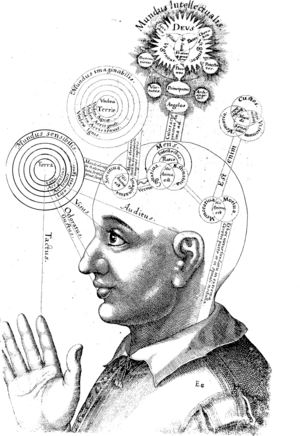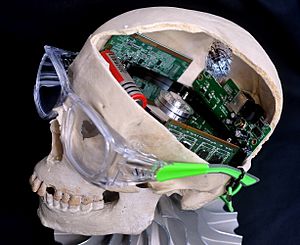Intelligence facts for kids
Intelligence is often described as how smart someone or something is. It's about your ability to think, learn, and understand the world around you. This includes things like using logic, solving problems, being creative, and planning ahead.
Basically, intelligence is the skill to notice information, remember it, and use it to act in smart ways. It helps you adapt to different situations.
While we mostly study intelligence in humans, animals and even plants show signs of it. Artificial intelligence (AI) is when machines, like computers, show intelligence. This usually happens through special software.
Scientists sometimes discuss whether intelligence comes more from your genetics (what you inherit) or your environment (what you learn and experience). They also think that intelligent behavior can be learned as living things react to things around them.
Contents
What is Intelligence?

The exact meaning of intelligence can be a bit tricky to agree on. However, many experts agree on some key ideas.
One common idea is that intelligence is a general mental ability. It helps you to:
- Think clearly and make good decisions.
- Plan things and solve problems.
- Understand difficult ideas.
- Learn new things quickly and from your experiences.
It's not just about doing well in school or on tests. It's more about understanding your surroundings. It's about "catching on" to things and "figuring out" what to do.
Another way to look at it is how people differ in their abilities. Some people are better at understanding complex ideas. Others are better at adapting to new situations. Everyone learns and thinks in their own way. A person's intelligence can change a bit depending on the situation.
Human Intelligence
Human intelligence is the special thinking power of people. It involves complex ways of thinking and a strong sense of motivation and self-awareness. Intelligence helps humans remember details about things. Then, they can use those memories to act smartly in the future.
It gives humans the ability to learn new things. We can also form concepts (like understanding what a "chair" is). We can understand ideas and reason (think logically). This includes recognizing patterns and using language to communicate. Intelligence allows humans to experience the world and think deeply.
Animal Intelligence
Even though humans are often the main focus, scientists also study animal intelligence. This is sometimes called animal cognition. Researchers want to understand how smart different animal species are. They also compare abilities between different types of animals.
They study how animals solve problems. They also look at how animals use numbers or understand sounds. This helps us learn more about how animals think and learn.
Artificial Intelligence (AI)
Artificial intelligence (AI) is when machines show intelligence. It's also a part of computer science that tries to create smart machines. AI systems are designed to sense their environment. Then, they take actions to have the best chance of success.
AI has made big steps in solving specific problems. For example, AI is very good at playing games. It can also solve crossword puzzles and read text from images. Some AI systems can even drive autonomous cars.
However, creating truly general intelligence, like human intelligence, is still a big goal for AI research. This is called strong AI.
See also
 In Spanish: Inteligencia para niños
In Spanish: Inteligencia para niños



